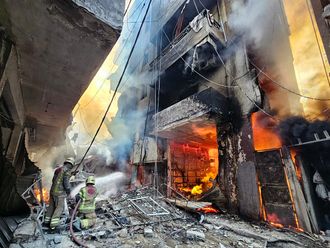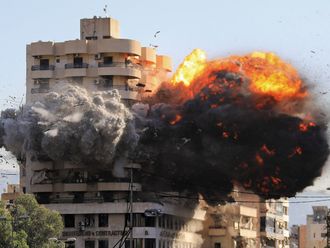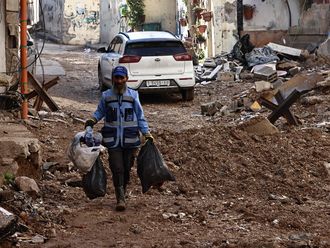Washington/Baghdad: The United States launched airstrikes in Iraq and Syria against more than 85 targets linked to Iran's Revolutionary Guard (IRGC) and militias it backs, reportedly killing nearly 40 people, in retaliation for a deadly attack on US troops.
The strikes, which included the use of long-range B-1 bombers flown from the United States, were the first in response to the attack last weekend in Jordan by Iran-backed militants, and more US military operations are expected in the coming days
While the strikes did not target sites inside Iran, they signaled a further escalation of conflict in the Middle East from Israel's nearly four-month-old war with Palestinian Hamas militants in Gaza.
The strikes hit targets including command and control centers, rockets, missiles and drone storage facilities, as well as logistics and munition supply chain facilities, the US military said in a statement.
85 targets hit
US forces hit more than 85 targets spanning seven locations, four in Syria and three in Iraq, said the military.
Iraq summoned the US charge d'affaires in Baghdad to deliver a formal protest. Iraq's Popular Mobilisation Forces, a state security force including Iran-backed groups, said 16 of its members were killed including fighters and medics. The government earlier said civilians were among 16 dead.
In Syria, the strikes killed 23 people who had been guarding the targeted locations, said Rami Abdulrahman, director of the Syrian Observatory for Human Rights, which reports on war in Syria.
read more
- What is Iran’s ‘Axis of Resistance’ responsible for attacks on US, Israel targets, which groups are involved?
- Iran threatens to ‘decisively respond’ to any US strikes as Biden weighs response to Jordan attack
- US approves strikes against Iranian targets in Iraq, Syria: Report
- US strikes 10 Al Houthi drones, downs unmanned Iranian aircraft
US Lieutenant General Douglas Sims, the director of the Joint Staff, said the attacks appeared to be successful, triggering large secondary explosions as the bombs hit militant weaponry. He said the strikes were undertaken knowing that there would likely be casualties among those in the facilities.
Iraq warns of dire consequences
The Iraqi military said the strikes were in the Iraqi border area and warned they could ignite instability in the region.
"These airstrikes constitute a violation of Iraqi sovereignty, undermine the efforts of the Iraqi government, and pose a threat that could lead Iraq and the region into dire consequences," Iraqi military spokesman Yahya Rasool said in a statement.
"Last night's attack on Syria and Iraq is an adventurous action and another strategic mistake by the US government, which will have no result other than intensifying tension and instability in the region," Iran's foreign ministry spokesman Nasser Kanani said in a statement.
Kanaani said the US attacks were designed "to overshadow the Zionist regime's crimes in Gaza". He did not indicate if Iran would take any action in response.
He urged the UN Security Council to prevent "illegal and unilateral US attacks in the region."
Kanaani said "the root cause of tensions and crises in the Middle East is Israel's occupation and genocide of Palestinians with America's unlimited support".
More to come
Last weekend's Jordan attack was the first deadly strike against US troops since the Israel-Hamas war erupted in October.
The United States has assessed that the drone that killed the three soldiers and wounded more than 40 other people was made by Iran, US officials have told Reuters.
"Our response began today. It will continue at times and places of our choosing," Biden said in a statement. Earlier on Friday, Biden and Pentagon leaders attended the Dover Air Force Base in Delaware as the remains of the three soldiers were returned.
US Defense Secretary Lloyd Austin said Biden had directed additional action against the IRGC and those linked to it.
"This is the start of our response," Austin said.
But the Pentagon has said it does not want war with Iran and does not believe Tehran wants war either, even as Republican pressure has increased on Biden to deal a blow directly.
"We do not seek conflict in the Middle East or anywhere else, but the president and I will not tolerate attacks on American forces," Austin said.
The top Republican on the Senate Armed Services Committee, Roger Wicker, criticised Biden for failing to impose a high enough cost on Iran, and taking too long to respond.
Before the retaliatory strikes on Friday, Iranian President Ebrahim Raisi said that Iran would not start a war but would "respond strongly" to anyone who tried to bully it.
White House national security spokesman John Kirby said the Biden administration had not communicated with Iran since the Jordan attack.
Kirby said the Iraqi government was notified about Friday's strikes ahead of time.
Baghdad and Washington, meanwhile, have agreed to set up a committee to start talks on the future of the US-led military coalition in Iraq, with the aim of setting a timetable for a phased withdrawal of troops and the end of the US-led coalition against Islamic State.












